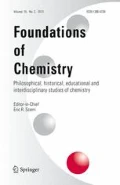Abstract
After a brief biography of Jaap van Brakel we set out his appropriation and use of the distinction between the manifest image and the scientific image of the world. In a certain sense van Brakel gives priority to the manifest image as the ultimate source of meaning in chemical discourses. He does not take sides in the debate about nominal and real essences, twin earths and so, but presents a compromise. As an active practitioner of the chemical arts he emphasises the indispensability of models as a main tool for chemical thinking. We then turn to van Brakel’s interest in forging an intercultural point of view in which philosophy of chemistry plays an important part.
Similar content being viewed by others
Notes
According to an older entry to the “Commentators Biographies” of the online Stanford Encyclopedia of Philosophy, van Brakel’s research interests at that time included: (1) giving form to philosophy of technology by integrating (and "fusing") methodological, epistemological, and ontological aspects on the one hand with social, political, and moral aspects on the other; (2) philosophical aspects of "sustainable" technological development; (3) foundations of cognitive science; (4) natural kinds; (5) colour; (6) emotion; (7) ethnocentricity and intercultural communication; (8) foundations of the concept of chance. Interestingly enough, philosophy of chemistry is not on that list.
Like Jaap van Brakel, both authors have their first academic education in chemical engineering. Indeed, there are other philosophers with an engineering background: Descartes (military engineering) and Wittgenstein (aeronautics), for example.
On the Philosophy of Chemistry, (van Brakel and Vermeeren 1981) is still a very useful bibliographic commentary, though van Brakel does not refer to it in his textbook.
In one of van Brakel’s very last introductory lectures on philosophy of science at Leuven (May 4th, 2010), K. R. has experienced this substantial critique of the science-centered views of Sellars, among other topics.
In a recent article about microessentialism, Paul Needham states the following: “But an early critique of the application of this line of thought [the importance of manifest descriptions] to chemical substances (van Brakel 1986) has not been similarly acknowledged, and later efforts in the same general direction … seem to have made little impression on philosophers writing on natural kinds”. (Needham 2011)
In his Philosophy of Chemistry, Jaap van Brakel does not particularly refer to chemical elements and the periodic table of the elements which might surprise some of the readers.
Additionally (this is not van Brakel’s claim), this fact offers a brilliant argument for the importance of philosophical activities.
In his presentation to the celebration session of the ISPC symposium in Oxford, one of us (K.R.) shortly referred to the first contact problem, using a scene from the Paramount Star Trek movie The First Contact: “Live long and prosper”, said the first volcan on Earth to the constructor of the warp engine at first contact in that scene. Although these words are translated in the movie, the human does not understand the alien (!). However, both, partly reluctantly, shake hands.
References
Harré, R.: Modeling: Gateway to Nature. Elsevier, Amsterdam (2005)
Hempel, C.G.: Aspects of Scientific Explanation. Free Press, New York (1970)
Klein, U.: Book review: v. Brakel, J., Philosophy of Chemistry, Leuven University Press, Leuven 2000 (Corrigendum). Synthese 57, 133–136 (2002)
Kripke, S.: Naming and Necessity. Harvard University Press, Cambridge, MA (1980)
Kuhn, T.H.: The Structure of Scientific Revolutions. Chicago University Press, Chicago (1970)
Latour, B.: We have Never been Modern. Harvard University Press, Cambridge, MA (1993)
Locke, J.: An Essay Concerning Human Understanding. Oxford University Press, Oxford (1690)
Needham, P.: Microessentialism: what is the argument? Nous. 45, 1–21 (2011)
Popper, K.R.: The logic of scientific discovery. Routledge, London (2002)
Putnam, H.: Mind, Language and Reality. Cambridge University Press, Cambridge (1975)
Scerri, E.R.: The Periodic Table: Its Story and its Significance. Oxford University Press, Oxford (2007)
Sellars, W.: Science, Perception and Reality. Routledge and Kegan Paul, London (1963)
van Brakel, J.: The chemistry of substances and the philosophy of natural kinds. Synthese 69, 291–324 (1986)
van Brakel, J.: Chemistry as the science of the transformation of substances. Synthese 111, 253–282 (1997)
van Brakel, J.: On the neglect of the philosophy of chemistry. Found. Chem. 1, 111–174 (1999)
van Brakel, J.: Philosophy of Chemistry. Leuven University Press, Leuven (2000)
van Brakel, J.: On the inventors of XYZ. Found. Chem. 7, 57–84 (2005)
van Brakel, J.: Kant’s legacy for the philosophy of chemistry. In: Baird, D., Scerri, E., McIntyre, L. (eds.) Boston Studies in the Philosophy of Science, chap. 4. Springer, Dordrecht (2006)
van Brakel, J.: Chemistry and physics: no need for metaphysical glue. Found. Chem. 12, 123–136 (2010)
van Brakel, J., Vermeeren, H.P.: On the philosophy of chemistry. Philos. Res. Arch. 7, 501–552 (1981)
Author information
Authors and Affiliations
Corresponding author
Rights and permissions
About this article
Cite this article
Ruthenberg, K., Harré, R. Philosophy of chemistry as intercultural philosophy: Jaap van Brakel. Found Chem 14, 193–203 (2012). https://doi.org/10.1007/s10698-012-9161-1
Published:
Issue Date:
DOI: https://doi.org/10.1007/s10698-012-9161-1




